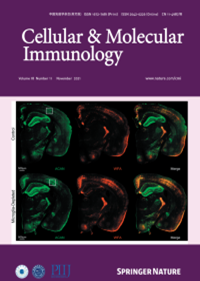Demyelination-derived lysophosphatidylserine promotes microglial dysfunction and neuropathology in a mouse model of Alzheimer’s disease
IF 19.8
1区 医学
Q1 IMMUNOLOGY
引用次数: 0
Abstract
Microglia dysfunction-associated neuroinflammation is an important driver of Alzheimer’s disease (AD), but the mechanism is poorly understood. Here, we show that demyelination promotes neuroinflammation and cognitive impairment via the lysophosphatidylserine (LysoPS)-GPR34 axis in AD. Demyelination is observed at the early stage and is accompanied by an increase in LysoPS in myelin debris in a 5xFAD mouse model of AD. Reducing the content of LysoPS in myelin or inhibiting its receptor GPR34 via genetic or pharmacological approaches can reduce microglial dysfunction and neuroinflammation and improve microglial Aβ phagocytosis, subsequently resulting in less Aβ deposition and memory restoration in 5xFAD mice. Furthermore, increased LysoPS production and microglial GPR34 expression were also observed in the brains of AD patients. These results reveal the pathogenic role of demyelination-derived LysoPS in microglial dysfunction and AD pathology and suggest that blocking GPR34 as a therapeutic strategy beyond targeting Aβ.

脱髓鞘源性溶磷脂酰丝氨酸促进阿尔茨海默病小鼠模型中的小胶质功能障碍和神经病理学。
小胶质细胞功能障碍相关的神经炎症是阿尔茨海默病(AD)的重要驱动因素,但其机制尚不清楚。在这里,我们发现脱髓鞘通过溶磷脂酰丝氨酸(LysoPS)-GPR34轴促进AD的神经炎症和认知障碍。在5xFAD AD小鼠模型中,早期观察到脱髓鞘,并伴有髓磷脂碎片中LysoPS的增加。通过遗传或药理学途径降低髓磷脂中LysoPS的含量或抑制其受体GPR34,可减轻小胶质细胞功能障碍和神经炎症,改善小胶质细胞对Aβ的吞噬,从而减少Aβ沉积和记忆恢复。此外,在AD患者的大脑中也观察到LysoPS的产生和小胶质细胞GPR34的表达增加。这些结果揭示了脱髓鞘来源的LysoPS在小胶质细胞功能障碍和AD病理中的致病作用,并提示阻断GPR34是一种超越靶向a β的治疗策略。
本文章由计算机程序翻译,如有差异,请以英文原文为准。
求助全文
约1分钟内获得全文
求助全文
来源期刊
CiteScore
31.20
自引率
1.20%
发文量
903
审稿时长
1 months
期刊介绍:
Cellular & Molecular Immunology, a monthly journal from the Chinese Society of Immunology and the University of Science and Technology of China, serves as a comprehensive platform covering both basic immunology research and clinical applications. The journal publishes a variety of article types, including Articles, Review Articles, Mini Reviews, and Short Communications, focusing on diverse aspects of cellular and molecular immunology.
文献相关原料
公司名称
产品信息
索莱宝
neutral balsam

 求助内容:
求助内容: 应助结果提醒方式:
应助结果提醒方式:


